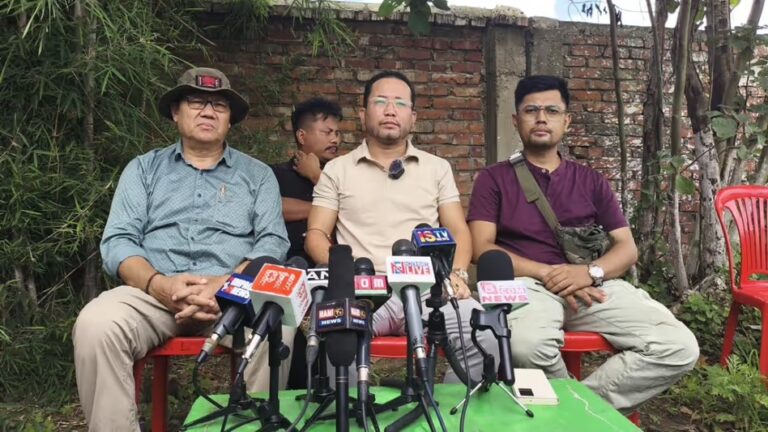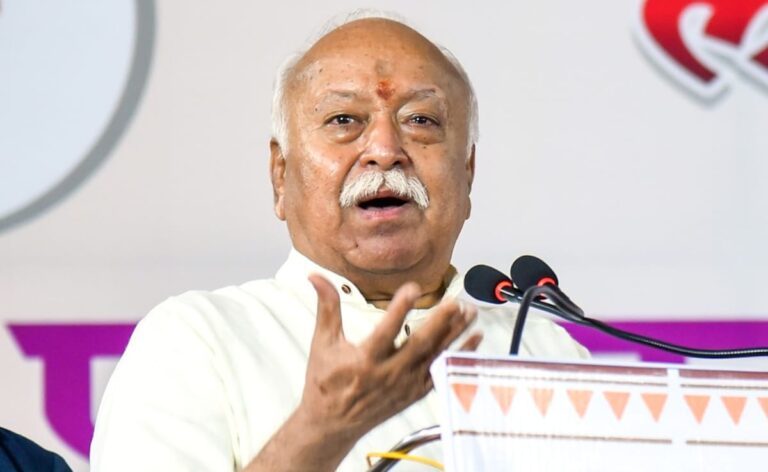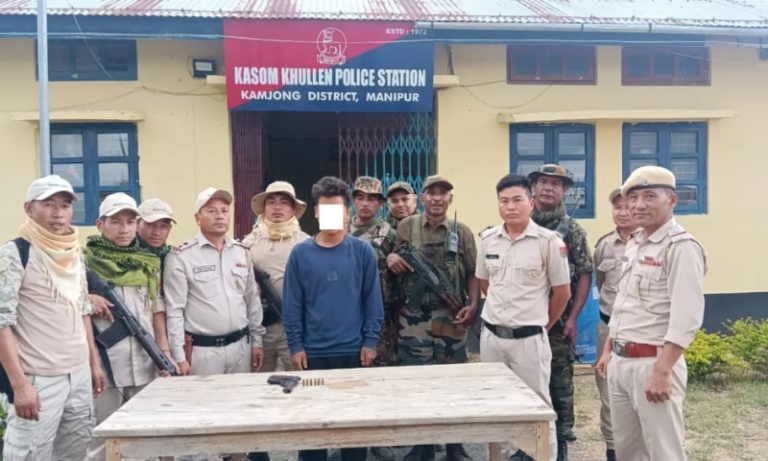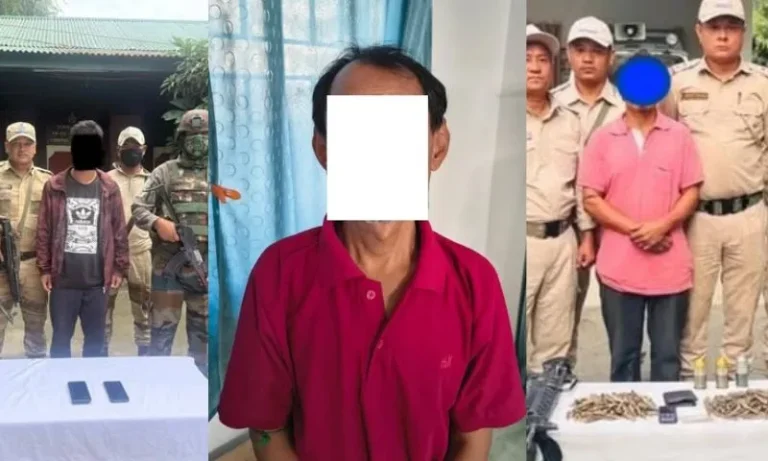No Compromise on Manipur’s Territorial Integrity: Unpacking BJP’s Firm Stance After President’s Rule
Summary of the News Article
In response to the imposition of President’s Rule in Manipur, BJP spokesperson Sambit Patra declared that there will be “no compromise on Manipur’s territorial integrity.” His strong statement reflects the party’s firm stance on safeguarding the state’s borders and addressing political instability, emphasizing that national unity and security remain paramount even in challenging times.
Introduction
Imagine a region with a rich history, diverse cultures, and complex political dynamics suddenly thrust into the national spotlight due to an unprecedented administrative move. That’s exactly what happened in Manipur when President’s Rule was imposed, shaking the very foundations of its local governance. In the midst of this turbulence, BJP spokesperson Sambit Patra made a resounding statement: “No compromise on Manipur’s territorial integrity.” In this article, we’re going to take a deep dive into what this statement means, why it matters, and how it fits into the larger puzzle of India’s political and territorial dynamics.
If you’re wondering how a single declaration can ripple through the corridors of power and affect the lives of millions, stick with me as we unpack the layers behind this issue, explore the historical context, and consider its future implications. We’re going to break down the complex interplay of local unrest, national security, and political rhetoric in a conversational style that makes even the most intricate details accessible and engaging.
Understanding President’s Rule in Manipur
What Is President’s Rule?
Before we get into the nitty-gritty of Sambit Patra’s statement, let’s first clarify what President’s Rule actually entails. Under Article 356 of the Indian Constitution, if a state government is unable to function according to constitutional norms, the central government can take direct control. Think of it as a safety net—an emergency measure to restore stability when local governance falters.
In Manipur, the imposition of President’s Rule signals that the state’s political machinery was unable to handle growing internal challenges. For the citizens, this can feel like a sudden pause in the democratic process, where the usual checks and balances are temporarily sidelined in favor of central oversight.
Why Manipur?
Manipur is no stranger to political complexities. With its unique blend of ethnic diversity, historical territorial disputes, and evolving political narratives, the state often finds itself at the crossroads of tradition and modernity. When President’s Rule is imposed, it’s not just an administrative maneuver—it’s a clear sign that something deep-rooted needs to be addressed. The decision reflects a crisis in local governance that has far-reaching implications, not only for the state but also for the nation’s broader federal structure.
Sambit Patra’s Bold Declaration: No Compromise on Territorial Integrity
What Did He Say?
In a stirring response to the recent developments in Manipur, BJP spokesperson Sambit Patra asserted, “No compromise on Manipur’s territorial integrity.” This wasn’t just a catchy slogan; it was a firm declaration that the central government and the BJP would stand resolutely behind the state’s defined boundaries and its right to self-governance.
Breaking Down the Statement
Let’s break this down. When Patra says “no compromise,” he is making it abundantly clear that any threat—whether internal or external—to the territorial boundaries of Manipur will not be tolerated. He is emphasizing the sanctity of Manipur’s borders and the importance of maintaining its political and geographical integrity.
Imagine you’re playing a game where the rules are non-negotiable. Just as you wouldn’t let anyone tamper with the boundaries of your playground, the BJP is signaling that the territorial lines of Manipur are inviolable. In a country as vast and diverse as India, this assertion carries significant weight, particularly in regions where border disputes and regional autonomy are hotly debated topics.
Historical Context: Manipur’s Journey and Its Territorial Significance
A Rich Tapestry of History
Manipur has a storied past, with a history that is as rich and diverse as its culture. Over the centuries, it has seen waves of migration, colonial influences, and regional conflicts that have all left their mark. Its territorial boundaries have often been a subject of intense negotiation and sometimes conflict, making the issue of territorial integrity deeply resonant with its people.
The Modern Political Landscape
In the modern era, the state’s territorial integrity has emerged as a symbol of both cultural identity and political sovereignty. For many in Manipur, the borders are not just lines on a map—they represent the hard-fought struggles of past generations and the aspirations for a stable and self-determined future. In this light, Patra’s statement is more than political rhetoric; it is a reaffirmation of the state’s right to exist on its own terms.
Contemporary Challenges
Today, Manipur faces a plethora of challenges—ranging from internal political discord to external security threats. The imposition of President’s Rule underscores the severity of these challenges. It signals that the local government was struggling to manage issues that could potentially destabilize not just Manipur, but the delicate balance of the region. Against this backdrop, ensuring that the state’s territorial integrity remains uncompromised becomes not only a matter of political principle but also of national security.
The Political Implications of Patra’s Statement
Reassuring the Nationalist Base
For the BJP, making a strong statement about territorial integrity is a strategic move that resonates with its nationalist base. In today’s political climate, issues of national identity and security are front and center. By stating “no compromise,” the party is reinforcing its commitment to a united and secure India, where every state’s boundaries are respected.
A Message to Political Opponents
This declaration also serves as a subtle jab at political opponents who might be perceived as soft on security or too willing to compromise on national issues. It sends a clear message: any attempts to erode the state’s territorial boundaries—whether through political maneuvering or otherwise—will be met with unwavering resistance. This is particularly important in regions like Manipur, where local sentiments can be incredibly strong and where any hint of territorial dilution could trigger widespread unrest.
Impact on Federal Dynamics
In a country governed by a federal structure, such strong assertions by the central government have far-reaching implications. They set precedents that influence how states and the center interact. Patra’s statement reinforces the idea that while states have a degree of autonomy, their territorial integrity is non-negotiable. This balance is crucial for maintaining national unity, and it reaffirms the central government’s role as the ultimate guardian of India’s borders.
Security Concerns and the Broader National Narrative
Ensuring Stability Amidst Uncertainty
Security is always a top priority in any nation, and India is no exception. In regions like Manipur, where geopolitical tensions can be high, maintaining a firm stance on territorial integrity is essential for national stability. The imposition of President’s Rule, while a drastic measure, is sometimes necessary to restore order when local governance fails. Patra’s assertive stance is a reflection of the government’s broader security policy, which emphasizes that no region will be left vulnerable to internal or external threats.
The Role of Intelligence and Surveillance
To understand the full implications of this statement, it’s important to consider the role of intelligence and surveillance in modern governance. With advanced technologies at our disposal, the central government is better equipped than ever to monitor and respond to potential security threats. Patra’s comments, therefore, are not just about rhetoric—they are backed by a robust system designed to ensure that any compromise on territorial integrity is swiftly addressed.
Public Confidence and National Pride
When a nation’s leaders take a strong stance on issues of sovereignty, it boosts public confidence and reinforces national pride. For the people of Manipur and the wider country, hearing that their government will not back down in the face of challenges is reassuring. It’s like having a reliable safety net that you know will always catch you, no matter how high you climb or how far you fall.
Local Reactions and the Sentiment on the Ground
Voices from Manipur
The people of Manipur have long been proud of their unique cultural and historical heritage. For many locals, the imposition of President’s Rule is seen as an unfortunate but necessary step to restore order. In this context, Sambit Patra’s firm declaration resonates deeply. It reassures them that despite the administrative challenges, their territorial rights and identity remain protected.
Mixed Reactions
However, not everyone is on the same page. Some critics argue that such statements, while strong, may not address the root causes of the unrest that led to the imposition of President’s Rule. There is a call for more inclusive governance and dialogue with local communities to ensure that long-standing issues are resolved in a manner that respects both tradition and modern administrative needs. It’s a classic case of the tension between central authority and local aspirations—a balance that is difficult to strike but absolutely essential for long-term stability.
The Role of Civil Society
Civil society organizations and local leaders have an important role to play in this scenario. They can help bridge the gap between the central government’s policies and the local population’s needs by fostering dialogue, promoting transparency, and advocating for reforms that address the underlying issues. In many ways, the situation in Manipur is a microcosm of the broader challenges facing federal India, where diverse regional identities must coexist with a unified national framework.
Economic Implications: How Political Stability Affects Growth
Investor Confidence
Political stability is a critical factor for economic growth. When there is uncertainty—like the imposition of President’s Rule—it can shake investor confidence. Businesses thrive in an environment where policies are clear and stable. Patra’s assertion that there will be “no compromise” sends a positive signal to investors that the government is committed to maintaining the integrity and security of the state, which in turn could spur economic development.
Impact on Local Infrastructure
In regions like Manipur, economic growth is closely tied to the stability of local governance. Disruptions in political administration can lead to delays in infrastructure projects, affecting everything from transportation to healthcare. By reaffirming the state’s territorial integrity, the central government is also laying the groundwork for a more secure environment where long-term development projects can be executed without fear of political interference or instability.
A Path to Sustainable Growth
Ultimately, a stable political environment fosters sustainable growth. The measures taken to ensure that Manipur’s territorial integrity is not compromised are part of a broader strategy to create conditions conducive to long-term economic prosperity. Whether it’s through better security, improved governance, or increased investor confidence, the goal is to ensure that every citizen can benefit from a stable and thriving economy.
Political Strategy and National Messaging
The Use of Strong Rhetoric
In today’s fast-paced political arena, strong rhetoric is often used to rally support and convey unwavering resolve. Sambit Patra’s statement is a textbook example of this strategy. It not only reassures the BJP’s base but also sends a clear message to political adversaries that any attempts to undermine national unity will be met with a firm response.
Balancing Diplomacy and Assertion
While the tone of the statement is assertive, it also reflects the delicate balancing act required in modern governance. On one hand, there is a need to project strength and resolve; on the other hand, maintaining open channels of communication with local leaders and stakeholders is crucial. The BJP’s stance is designed to be both a declaration of intent and a promise of action—a promise that the central government will always act to protect the nation’s interests, even if it means taking drastic measures when local governance fails.
Analyzing the Broader National Context
Federalism in India
India’s federal structure is a marvel of balancing diverse regional identities with national unity. However, it is also a complex system where tensions can arise when central interventions are seen as overreaching. The imposition of President’s Rule in Manipur is a reminder of the challenges inherent in this system. It underscores the fact that while states enjoy a degree of autonomy, their territorial integrity remains a core component of national security.
Regional Security Concerns
Manipur’s geographical location and its history of insurgency and political unrest mean that security concerns are never far from the surface. Ensuring that the state’s borders remain secure is not just about political symbolism—it is about protecting lives and maintaining the stability necessary for progress. The strong stance on territorial integrity is therefore also a strategic move in the broader context of national security, one that is essential in a country with as many moving parts as India.
Implications for National Policy
Patra’s declaration and the events in Manipur are likely to influence national policy discussions for years to come. They highlight the need for more robust mechanisms to handle regional unrest without compromising the democratic process. Policymakers may well look at this incident as a case study in how to balance assertive central intervention with respectful dialogue with local communities, ultimately paving the way for reforms that strengthen India’s federal framework.
Looking Ahead: The Future of Manipur and National Unity
Short-Term Recovery and Long-Term Reforms
In the short term, the imposition of President’s Rule in Manipur is aimed at restoring stability and addressing immediate administrative challenges. But the long-term vision must go beyond quick fixes. It’s about implementing reforms that address the root causes of political unrest, improving local governance, and ensuring that every citizen feels heard and protected. Patra’s declaration is a starting point—a bold reminder of what the nation stands for—but it must be accompanied by concrete actions that bring about lasting change.
Community Engagement and Inclusive Governance
For lasting stability, it is crucial that the central government works closely with local communities. Inclusive governance, where local voices are actively involved in decision-making, is key to resolving conflicts and building trust. In Manipur, as in other parts of India, this means not just enforcing policies from the top but engaging with grassroots organizations, local leaders, and the citizens themselves to craft solutions that resonate with everyone.
A Call for National Unity
At its core, the issue of territorial integrity is a question of national unity. The challenges faced by Manipur are a microcosm of the broader challenges that India faces—a country marked by incredible diversity, yet bound together by a shared identity. By taking a firm stance on territorial integrity, the government is not only addressing a specific issue in Manipur but also reinforcing the principle that every state, every region, is an integral part of the national mosaic.
Conclusion: Standing Firm in the Face of Adversity
The declaration by BJP’s Sambit Patra that there will be “no compromise on Manipur’s territorial integrity” comes at a critical juncture for the state and the nation. It is a powerful statement that echoes across the corridors of power, reflecting the firm resolve to maintain national unity, security, and respect for regional identities.
As we’ve explored in this article, the imposition of President’s Rule in Manipur is a complex issue with roots in historical, political, and social challenges. It is a stark reminder of the delicate balance between state autonomy and central oversight in a diverse country like India. While the immediate goal is to restore stability and address governance issues, the broader objective must be to implement reforms that ensure every region can flourish without compromising on its identity or security.
In a world where change is the only constant, the words “no compromise” serve as both a promise and a challenge—a challenge to ensure that the spirit of unity and resilience prevails, no matter how turbulent the times may become. By embracing this ethos, we can hope for a future where every citizen, every community, stands strong and united, contributing to the rich, vibrant tapestry that is India.
FAQs
- What triggered the imposition of President’s Rule in Manipur?
The state faced significant political and administrative challenges that led to a breakdown in local governance, prompting the central government to impose President’s Rule to restore stability. - What does Sambit Patra mean by “no compromise on Manipur’s territorial integrity”?
He is asserting that the boundaries and sovereignty of Manipur will be strictly maintained, and any attempt to undermine or alter them will not be tolerated, reflecting a firm stance on national unity and security. - How does the issue of territorial integrity affect national security in India?
Maintaining clear and undisputed territorial boundaries is crucial for national security, as it prevents external threats and internal instability, ensuring that every state contributes to a unified, secure nation. - What are the potential long-term implications of this stance on local governance?
While the strong stance reinforces national unity, it also underscores the need for improved local governance and inclusive policies that address the unique challenges of regions like Manipur, ultimately fostering stability and growth. - How can local communities contribute to maintaining stability in times of political uncertainty?
By actively engaging in dialogue with government officials, participating in community outreach programs, and supporting reforms that promote transparency and inclusivity, local communities can play a vital role in ensuring lasting stability.





